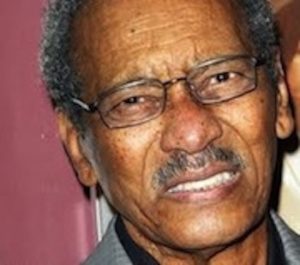
Dick Anthony Williams
*Dick Anthony Williams was born on this date in 1934. He was a Black actor.
Williams was born on the South Side of Chicago and was treated for polio for four years of his childhood in a hospital. In an interview with The Chicago Tribune, he said being hospitalized had advantages. It kept him safe, he said, and he “ate well.” But, he added, “It’s very gratifying now to see an iron lung and not have to get into it.”
He began acting in Chicago while working in a singing group called the Williams Brothers Quartet. He moved to Los Angeles, where he directed and starred in a production of Joseph Dolan Tuotti’s “Big Time Buck White.” Reviewing it for The New York Times when it played in New York in 1968, Clive Barnes praised Williams’s Buck, a Black Panther-like leader, for the “weary tolerance” with which he raises the consciousness of others. In the early 1970s, Williams and the director Woodie King Jr. were co-founders of the New Federal Theater, an actors’ workshop open to professionals and amateurs, at minimal cost, at the Henry Street Settlement. The theater became a showcase for playwrights and actors, including David Henry Hwang, Ntozake Shange, Amiri Baraka, Samuel L. Jackson, Morgan Freeman, and Denzel Washington.
His multilayered portrayal of a Detroit pimp won him the Drama Desk Award and a Tony nomination. This was a cautionary version of the more flamboyant character he portrayed in the blaxploitation movie “The Mack,” starring Max Julien and Richard Pryor, released in 1973. Williams’s character, Pretty Tony, was a philosopher-pimp armed with a sword cane, a figure said to have left its stamp on the pimp-centric worldview of hip-hop artists like Tupac Shakur and Ludacris. In 1974 he was praised and nominated for Tony Awards for his work in the dramas “Black Picture Show” and “What the Wine-Sellers Buy.” Ron Milner’s “What the Wine-Sellers Buy,” the first play by a black, was produced by Joseph Papp’s New York Shakespeare Festival.
Williams was in the top rank of the first generation of Black actors to find steady work in American film, television, and theater. Though he was often cast in supporting roles, critics singled out his performances for their intelligence and subtlety. He won acclaim for his portrayal of Malcolm X opposite Paul Winfield’s Rev. Dr. Martin Luther King Jr. in the 1978 NBC mini-series “King,” and again in several theatrical productions of Jeff Stetson’s play “The Meeting,” which depicted a fictional meeting between the two civil rights leaders.
In the early 1990s, he was a regular on the ABC-TV “Homefront.” He also had roles in many other television shows and in movies, including “The Jerk” (as Steve Martin’s brother) and Spike Lee’s “Mo’ Better Blues.” He was a prolific actor who created enduring roles in blaxploitation films during the 1970s while simultaneously securing his reputation on the New York stage with Tony-nominated performances and a Drama Desk Award,
Dick Anthony Williams died on February 16, 2012, in Los Angeles. He was 77. Two daughters, Mona and Mikah, and a son, Jason, survive him. His wife, the actress Gloria Edwards, died in 1988.